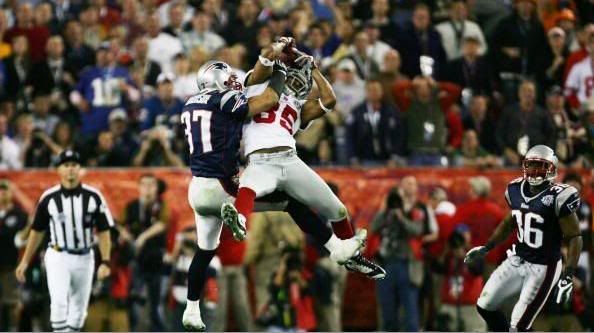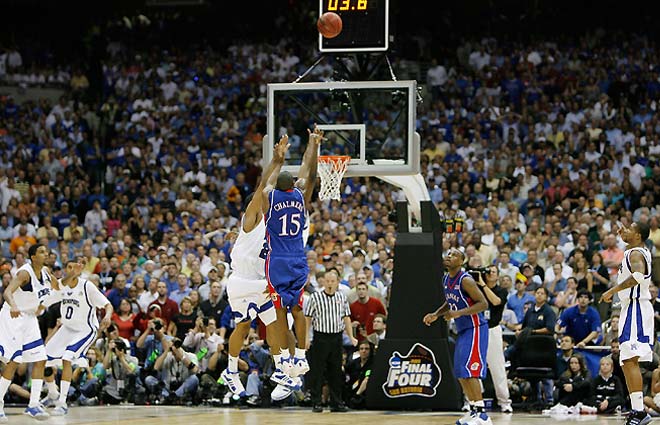However, over the past 27 months, I have witnessed what seems to be karmic forces delving into the sports world, making their presence known on the biggest stages there are to offer.
January 1, 2006. The sporting world was hailing it as a crowning point for Southern California. The Trojans were the defending national champions, winners of 34 games in a row, and they trotted out back-to-back Heisman Trophy winners in QB Matt Leinart and RB Reggie Bush. To boot, the title game was in their own backyard, the Rose Bowl in Pasadena. Their offense was probably one of the best pro-style offenses college football fans will ever witness; the Trojans rolled to 600 points in a dozen regular season victories, breaking 40 points nine times, 50 points seven times, 60 points three times, and 70 points once. There were naysayers that pointed to their defense as a weak point. Indeed, defensive linemen Mike Patterson and Shaun Cody and linebackers Matt Grootegoed and Lofa Tatupu, bricks in the shattering 2004 edition of the team, weren't there for 2005. But everyone was blinded by the dazzling offense; it was the new "Showtime" in Los Angeles, reminding people of the Magic-led Lakers of the 1980s. They even appeared to have karma on their side, pulling a miracle out of the fire in South Bend against rival Notre Dame.
Nobody gave Texas a shot in the title game against Southern Cal. The Longhorns had an explosive offense of their own, racking up 541 points in 11 regular season games, and then dropping 70 on Colorado in the Big 12 Championship Game, which clinched UT's ticket to Pasadena for a date with USC. The reason Texas was overlooked - aside from EuScPN's hype machine - was because of two things: Mack Brown and Vince Young. Mack had long been dismissed as an ace recruiter who could coach about as well as some random guy off the street can juggle knives. And the offense he ran - led by Heisman runner-up Vince Young - was a spread, which had not been fully embraced by college football yet; it was still viewed as little more than a gimmick.
So what did Texas do? They toppled the Trojan Empire, exposing what everyone should've seen all along: USC's defense was shielded all year by Showtime. Karma exacted vengeance on the Trojans in the form of 267 yards passing and 200 yards rushing.

February 3, 2008. Once again, the sporting world tuned in to witness another coronation. This time they watched in disgust, as the New England Patriots, the universally despised villians, took the field in Arizona for Super Bowl XLII, looking to become the first team since the 1972 Miami Dolphins to finish the season as undefeated Super Bowl Champions. Like USC, the Patriots were driven by one of the greatest offenses ever seen on a football field, as Tom Brady and Randy Moss set single season NFL records for passing touchdowns (50) and receiving touchdowns (23), respectively. As a team, the Patriots set NFL records with 589 points and 75 total touchdowns en route to the first 16-0 regular season ever. The final game of those 16 was a nail-biting 38-35 triumph in the Meadowlands against the New York Giants.
Normally, a team going 16-0 while laying waste to the rest of the league would have fans buzzing about the possibilities of witnessing history; but not this time. This time, America had to hold back their collective vomit. After the first week of the season, the Patriots - already loathed by most for their aura of arrogance, personified perfectly by head coach Bill Belichick - were busted for videotaping the defensive signals of their Week 1 opponent, the New York Jets. The NFL punished the Patriots, making them forfeit their first round pick in the upcoming draft, and personally fining Belichick $500,000. The already rabid Patriots haters now had even more justification to spew venom. All the accomplishments of the Patriots, including Super Bowl victories in 2001, 2003 and 2004, were called into question. Belichick used it as a rallying point, and the Patriots collectively declared war on the NFL. For the rest of the season they bordered on the line of classlessness, never surrendering the opportunity to score an extra touchdown against an undermatched opponent. They won their first eight games by an average of 25.5 points, and for the season averaged a 19.7 gap between themselves and their foes. The fireworks from their explosive offense were slightly diminished in the playoffs due to the cold weather in Foxboro, but the Patriots got past Jacksonville and San Diego, punching a ticket to balmy Arizona, and a date with destiny at 18-0.
The Giants, on the other hand, were never expected to come close to the Super Bowl. While the Cowboys ruled the NFC East and the Packers' resurgence grabbed the headlines, Eli Manning sputtered through another mediocre season as Giants' QB, finishing with 23 touchdown passes and 20 interceptions. Once the playoffs started though, the Giants, whose only loss away from home all season had been the season opener in Dallas, felt right at home on the road. They dispatched Tampa Bay and the archrival Cowboys before beating Green Bay at Lambeau Field in the 3rd coldest game ever, forcing Brett Favre into retirement. And still, no one expected anything to happen in the Super Bowl aside from the Patriots winning.
So what happened? The Giants, fueled by a relentless pass rush on Tom Brady and one of the greatest plays in Super Bowl history - Eli Manning's magical escape from a sack and his miracle pass that David Tyree pinned aganst his helmet as he fell - toppled what many had thought was the best team to ever play in the NFL. The Patriots' defense folded on the Giants' final drive, revealing the old age that the pundits had called "experience" all season. The transgressions of Belichick and the Patriots finally caught up to them in the desert.

April 7, 2008. It had been a while since college basketball gave us a game to truly remember. Yeah, the 2005 Midwest Regional Final between Illinois and Arizona, and the Championship Game that year between Illinois and North Carolina were both memorable, but when was the last time we had a truly legendary game in the Final Four or for the title?
When all four #1 seeds - Carolina, Kansas, Memphis and UCLA - reached the Final Four in San Antonio this year, many thought we would be treated to the greatest Final Four in history. Instead, we were treated to two blowouts. Memphis's athleticism punched out UCLA by 15, and Kansas had North Carolina down 40-12 in the first half. The Tar Heels almost made a game of it, nearly pulling off the greatest comeback in Final Four history by getting to within four, but the Jayhawks had enough left in the tank to run away from UNC in the end, 84-66. Yet, despite dispatching the #1 overall seed in the tournament, Kansas was given almost no shot against Memphis. That's not really surprising though. Despite their less than stellar conference, Memphis was 38-1, having set the NCAA men's record for most wins ever in a season by a college basketball team, and the way they mowed down Michigan State and Texas in the South Regional, and then UCLA in the National Semifinal, it wasn't unreasonable to expect the Tigers to keep cruising. Their backcourt of Derrick Rose and Chris Douglas-Roberts was unstoppable, as both players seemed to be clinching their statuses as lottery picks in the NBA Draft.
And yet all throughout the NCAA Tournament, Memphis had played with fire. Their borderline terrible free throw shooting which had plagued them all year had suddenly disappeared in the tournament. While they shot less than 60% throughout the regular season, they were up in the 70s so far in March Madness. In the second round against Mississippi State, they only made 15 of 32 attempts, and survived, 77-74. From there, they took off. Against Michigan State, they converted 26 of 35 (74.3%). Against Texas, they were 30-36 (83.3%). Against UCLA, 20 for 23 (87.0%). But the thing was, those last three games were all blowouts. Memphis beat Michigan State by 18, Texas by 18 and UCLA by 15. The question about Memphis being able to make their free throws in the clutch had not been answered yet.
For a time Monday night, it seemed like they would never have to answer it. The title game was a close game throughout, with Derrick Rose coming alive in the second half and staking Memphis to a seemingly insurmountable 60-51 lead with only 2:12 to play. Kansas quickly cut it to 60-56, however, with a jumper, a steal, and a three. Now, Memphis's intestinal fortitude would be tested. Douglas-Roberts answered the call, calmly sinking a pair of free throws, putting the lead at 62-56 with 99 seconds left. Kansas fouled out Memphis's Joey Dorsey seconds later, and made two free throws of their own; this started the giant spiral of choke by the Tigers. Douglas-Roberts was fouled, and missed the front end of the one-and-one, giving the ball back to Kansas, the deficit only four. A jumper with 1:01 left made it 62-60. Memphis ran the clock down while the Jayhawks D'ed them up, and Kansas got the missed shot they wanted, but quickly turned the ball back over. Douglas-Roberts went to the line with 16 seconds left, a chance to basically ice away the title for Memphis.
Instead, he missed both free throws. Miraculously, the Tigers recovered the offensive rebound, and this time it was Derrick Rose that went to the line. Only ten seconds remained now; two free throws would put Memphis up four. Rose, who had been so amazing throughout the Regional and into the Final Four, had a chance to leave as a legend; clinch the title for the Tigers and bolt for the NBA while winning the hearts of every Memphis fan in the process.
Instead, he made only one of two. We all know what happened from there. Kansas raced down the floor, Mario Chalmers made the three, and Kansas ran away from Memphis in overtime. I can only imagine the agony Memphis fans feel. The only thing I can possibly relate it to is the 2005 NBA Finals. After six grueling games and three quarters, the Pistons and Spurs were dead locked, but San Antonio pulled away in the final quarter, leaving the Pistons as close to repeating as champions as they could come without actually doing it. Monday night, Memphis came as close to winning the NCAA Championship as one team can without actually closing. The law of averages exacted cruel, cruel revenge on the Tigers. Karma finally caught them by their tails.

No comments:
Post a Comment